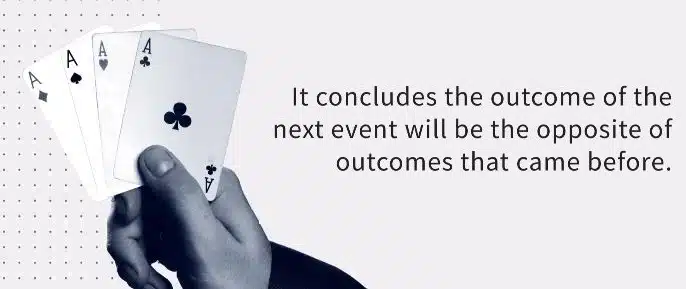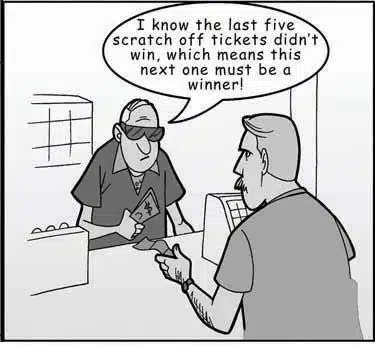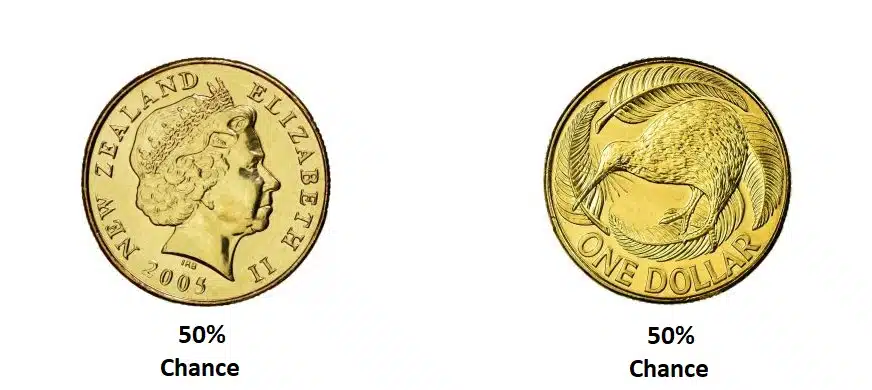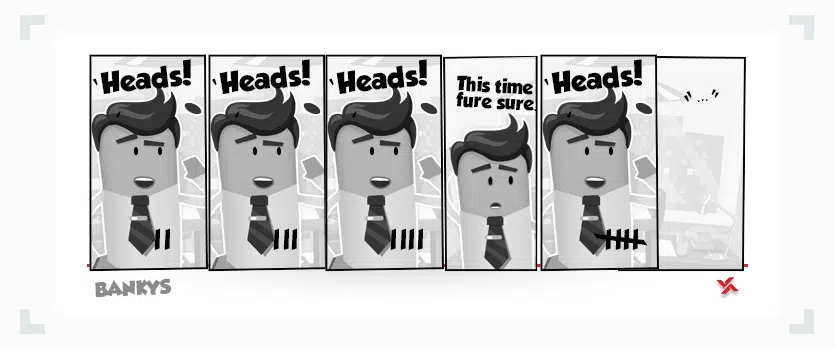What is gamblers fallacy, and why you should avoid it!
Well, whether you are a gambler or not, the human mind is programmed to assume that if a random outcome happens more than the expected number of times, it is less likely that the same result will occur in the future.

This is a classic example of wrong logic or human error. In gambling, this paradox is very common and is called Gambler’s Fallacy.
Therefore, if you want to be a successful gambler, understanding the gamblers fallacy and the results it can cause will be very useful.
The gambler’s fallacy, also referred to as the Monte Carlo fallacy is a popular gambling misconception. Gamblers believe their chances of experiencing some random event have increased or decreased.
This is due to recent unrelated events. Even though these events are entirely unrelated, the gambler tends to think that something changed in the odds of this particular random event happening.
What is gamblers fallacy?
You need a deep understanding of the game to witness the gamblers fallacy in full effect.
For example, if a roulette wheel lands on red five times in a row, many people would bet on black, assuming that a black outcome was more likely.
This phenomenon is part of the gambler’s fallacy.
The gambler’s fallacy does not apply to games of pure chance such as coin-flipping or lottery drawings, where each event should be considered independent from all other events (past, present, and future)
A typical example is that “the next time a coin comes up heads, then it will come up tails.”

You can model this situation by considering a deck of cards with only two “cards” where one card is a heart, and the other card is a space. The probability of drawing either card is 50%.
If one assumes that every game is independent of all past games, then the probability of drawing hearts twice in a row (when drawing two cards sequentially without replacing) would be 25%.
However, there are two different situations.
Where did it start?
A classic example of this phenomenon occurred in a Monte Carlo casino in 1913.
The casino’s directors noticed an abnormally high frequency of black coming up in consecutive spins and resolved to investigate why this might be happening.
They commissioned physicist and mathematician Jean le Rond d’Alembert to investigate their roulette wheels for bias.
D’Alembert discovered that each was subtly different from the others. Some were subtly easier to win than others.
However, the conclusion was that these differences were too small to account for their observed results. He, therefore, concluded that any bias was probably due to chance.
Probability explanation
When you flip a coin, the probability of getting heads or tails is 50 per cent. So if you were to flip a coin ten times and it came up heads each time, what do you think is the probability that it will come up tails on the next flip?
Many people would guess that it’s now more likely than not that the next flip will be tails. This is because the coin has been tossing heads so often. That’s not true.

The probability of getting ahead or a tail is still 50 per cent. However, many people believe that they are due for some tails to compensate after getting several heads in a row. This phenomenon is known as the “gambler’s fallacy.”
The gambler’s fallacy can occur after a series of events with a fixed probability. It’s based on the false belief that past events can influence future outcomes when, in reality, each event should be considered an independent trial.
Coin toss outcome and probability
You can better understand the fallacy with a coin casino. Consider the repeated toss of a fair coin. With a fair coin, the outcomes in various tosses remain statistically independent.
The chances of getting heads with a single toss are 1/2 (just as it is for getting tails).
It follows from this that the probability of getting two heads in two tosses is 1/4, and the probability of getting three heads in three tosses is 1/8.

If we continue tossing the coin enough times, we will almost surely get a sequence containing an arbitrarily long run of heads at some point.
However, no matter how long a run we observe of either heads or tails (in either order), this will not affect the likelihood of seeing such a run in future tosses.
How gamblers fallacy provokes problems
Most gamblers develop many problems at the casino with this fallacy. This is also known as the law of averages.
The gambler’s fallacy arises from a belief in a law of small numbers, leading to the erroneous belief that small samples must represent the larger population.
Another example is when someone expects that they will “catch up” by winning soon after having spent some time losing.
The gambler may feel they are due for a win after losing many consecutive wagers or losing money on a given day or during a given week.

The fallacy can also apply to gambling games such as blackjack or roulette. These situations involve increasing or decreasing probabilities.
This is based on what has happened in preceding events. It can affect how an individual perceives future probabilities and turn to irresponsible gambling.
Gambling strategies vs. gamblers fallacy
How does the gambler’s fallacy fair against time-proven gambling strategies?
For example, seeing black numbers come up five times in a row on roulette leads some gamblers to think red must be “due” (i.e., more likely to come up). This is because black came up so many times.
This is not how probability works. But it’s easy to understand how someone might make this mistake.
If after watching the game for a while, seeing black come up five times might start to feel significant and unusual. Like something unique should happen next because black has been dominant lately.
Strategies like the Martingale system are based on this same type of logic. However, they’re deliberate rather than accidental.
FAQ
Does the gambler’s fallacy ever win?
Yes, you will occasionally see streaks of luck that appear to defy the odds. But to a mathematician, those are simply happy accidents.
How do I avoid the gambler’s fallacy?
The only way to eliminate this bias is by educating yourself about expected value and thinking about gambling in terms of probability instead of results.
Does the gambler’s fallacy apply only to gambling?
Gambler’s fallacy can apply to anything that involves multiple repeated trials.
Sources:
- https://www.investopedia.com/terms/g/gamblersfallacy.asp (great video explaining Gamblers Fallacy)
- https://en.wikipedia.org/wiki/Gambler%27s_fallacy